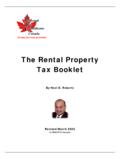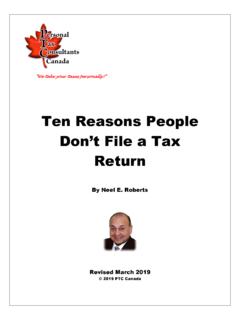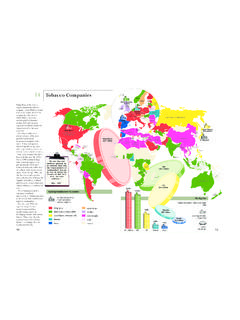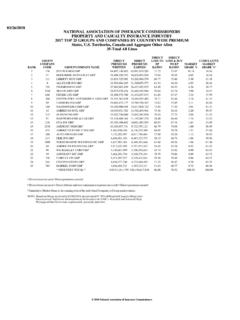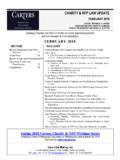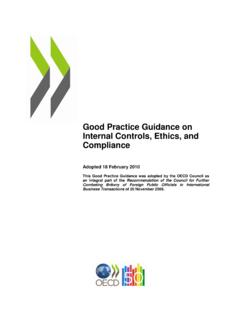Transcription of Ten Ways to Assess a - PTC Canada
1 We take your taxes personally! Ten Ways to Assess a Tax consultant s Fees By Neel E. Roberts Revised May 2018 2018 PTC Canada Ten Ways to Assess a Tax consultant s Fees PTC Canada 2018 PTC Canada Page 1 Table of Contents Ten Ways to Assess a Tax consultant s Fees 2 Free Tax Booklets 7 Our Free Services 7 Other Services by PTC Canada 8 Reference Books and Guides 9 Contact Information 10 CRA Contacts 11 Ten Ways to Assess a Tax consultant s Fees PTC Canada 2018 PTC Canada Page 2 Ten Ways to Assess a Tax consultant s Fees Have you wondered what tax consultation services should cost? Do you feel you have overpaid? Did you get the service you expected? Many taxpayers ask these questions, because there are no standards or guidelines as there are for some other professions.
2 Even those who belong to professional associations have the freedom to set fees as they choose, and these can vary widely. With such variation, how does the average taxpayer know where to start? While this handout is in no way an official guide to this rarely discussed subject, it is unique and will help you find value for your hard-earned money! 1. Determine your needs. This is the place to start. Do you need a simple T4 return filed annually without hassle? Or is CRA insisting you file several years of complicated overdue returns immediately? There is a dramatic difference between these two situations. Also, do you want to become more strategic in your tax planning, or do you just want to spend a few minutes a year and get it over with?
3 The answers to these questions, coupled with your level of knowledge of the tax system, will determine the type of professional you want to deal with. This is a vast topic, and I suggest you start with PTC Canada s Tax Summary Worksheet, available on our website at Generally, the more complicated your situation looks to you, the more high-end you will need to go. The next section will help you select the right pro. 2. Determine the professional s specialty. The Canadian tax system is huge for a country so small. With the average Canadian paying 50% in taxes and everyone looking for a break, it s no wonder there is an encyclopedia of rules between you and savings. Thousands of CRA employees administer the system, and tens of thousands of people work in the consulting industry, so it helps to have an idea how to start looking for the right person or firm.
4 PTC Canada s Canadian Tax Secrets Guide has an entire chapter on choosing the right tax professional (chapter 10, ). Once you have determined your needs, find out what the professional specializes in. Most pros will tell you, but you can also look at their advertising. If their ads or mission are unclear, or they appear to be trying to do everything in the book, keep shopping around. There are lots out there. Even if you have to go outside your immediate area, you should be able Ten Ways to Assess a Tax consultant s Fees PTC Canada 2018 PTC Canada Page 3 to find one that matches your needs. The bottom line here is whether the person or firm is the most qualified for you. While credentials like accounting designations are helpful, they don t tell the whole story.
5 The internet offers new ways of meeting your needs without leaving your home. PTC Canada s Zero Stop Taxes offers this convenience, and over 50% of our clients do business this way. A professional who respects your time by making it easy can only have your interests at heart! 3. Get as much free stuff as possible. A well-seasoned and organized tax pro should be able to offer free publications beyond CRA s materials. Check out their brochures, booklets, and handouts. Chances are, if you find these helpful before you do business, you will feel the same way about the pro after the job is complete. The free stuff is there to help you make an informed decision without wasting your time or money.
6 Some pros may even give you a free consultation, which is wonderful. PTC Canada s free materials are posted on our website at , and we try to assist the taxpayer with a free consultation whenever possible. Sometimes the best things in life really are free! 4. Get a quote. This is easy if the return is simple, with few complications. Most firms and individuals are qualified to offer standard service, and you can shop around. I have seen prices as cheap as $ , but I would be concerned about quality at that rate. Tax companies like H & R Block start at between $50 and $100, and they are well suited to deliver good service for this price. Other companies, like PTC Canada , accounting firms, and tax specialists, start around $100 to $200, for a few reasons.
7 First, their direct costs per client are higher due to their lower volume. Second, they tend to focus on more in-depth returns to remain profitable. Many tax companies other than the giants like H & R Block do other kinds of work outside the regular tax season. One of PTC Canada s main markets is late filers, in addition to our other tax services. There are three ways to determine price: first, by the time involved; second, by the amount of paperwork to be drawn up; and third, by the whole job, regardless of time or paperwork. PTC Canada prefers the third method, as we believe it is in the Ten Ways to Assess a Tax consultant s Fees PTC Canada 2018 PTC Canada Page 4 best interests of the client.
8 While we try to stand by our quotes, we sometimes have to make adjustments, especially on the intricate jobs, which amount to less than 10% of our work. Depending on your situation, a professional should be able to quote you upfront if they have enough information. A firm quote in writing is almost as good as a binding contract, if you should ever need to enforce it. 5. Consider a consultation instead of full services. If you have a lot of tax work to be done, or you need assistance completing your taxes, consider the less expensive route of a consultation. Even after using PTC Canada s free resources and everything else out there, you may feel you need more guidance. Instead of handing the work to a pro, you could have him draft an action plan so that you can finish it off yourself.
9 This is cheaper and assures you that your strategy is on track. It s almost like hiring a lawyer to show you how to present your case, rather than having him go to court for you. 6. See if you or someone else can do some of the work. Sometimes, it s just better to let the pro handle the case. Some consultants will let you do the more repetitive work to save money. PTC Canada always encourages clients to do their own bookwork, as it can save them thousands of dollars. We also allow clients to handle matters that are outside of taxes, though related to them, such as banks, CRA, maintenance enforcement, etc. Check with the tax pro to see if they can accommodate you in this way. Make sure you can do the work accurately so that the pro can use it.
10 Otherwise, it may have to be redone at your expense! 7. Be careful about overpaying. This becomes a problem when a taxpayer goes to a large accounting firm for a simple return. When the bill comes for $500 for something that could have cost $50, the client wonders why. The problem is not with the firm, as the return will be well done, but with the client who did not shop around. To a large firm, a basic return means pennies and the folks there don t have time to rationalize their fee to the client. They re too busy serving clients who pay tens of thousands of dollars to solve million-dollar problems. If you don t ask for a quote or do your due diligence, you may be hit with what looks like an excessive bill.
